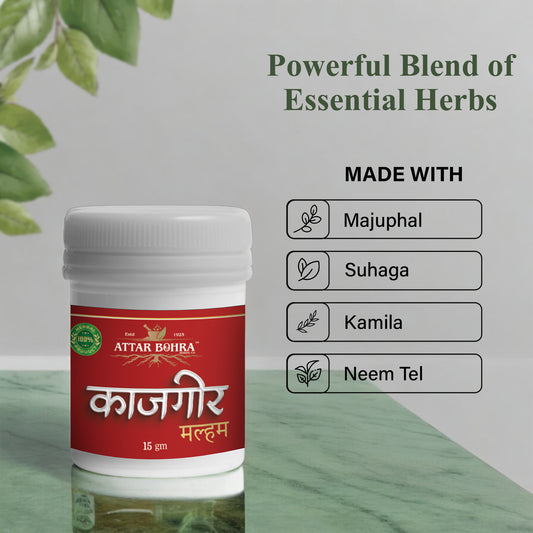Acne & Pimples: Causes, Symptoms, and Natural Ayurvedic Treatments
Acne and pimples are common skin conditions that affect people of all ages, particularly teenagers and young adults. These conditions occur when hair follicles become clogged with oil and dead skin cells, leading to the development of pimples, cysts, and other blemishes.
Key Facts
- Prevalence: Affects over 85% of people between the ages of 12 and 24.
- Common Causes: Hormonal changes, excessive oil production, clogged pores, and bacteria.
- Symptoms: Pimples, blackheads, whiteheads, cysts, and inflammation.
Symptoms
Acne and pimples manifest in various forms:
- Pimples: Small, raised red bumps that may contain pus.
- Blackheads: Open pores clogged with oil and dead skin, turning black.
- Whiteheads: Closed clogged pores, appearing as small white bumps.
- Cysts: Large, painful, pus-filled lumps under the skin.
Causes
The primary causes of acne and pimples include:
- Excessive oil production: Overactive sebaceous glands can lead to blocked pores.
- Hormonal changes: Puberty, menstruation, and stress can trigger increased oil production.
- Bacteria: The presence of Propionibacterium acnes bacteria can aggravate acne.
- Diet: High-glycemic foods and dairy products may contribute to breakouts.
Risk Factors
Several factors can increase the likelihood of developing acne:
- Hormonal changes: Common during puberty, pregnancy, and menstruation.
- Genetics: A family history of acne can increase susceptibility.
- Certain medications: Steroids, birth control pills, or medications that contain lithium can trigger acne.
Diagnosis
A dermatologist can diagnose acne based on a physical exam and medical history. In some cases, additional tests may be required to identify any underlying hormonal imbalances.
Prevention
While acne cannot always be prevented, the following measures can help reduce its occurrence:
- Proper skincare: Regularly cleanse your face to remove excess oils and dirt.
- Non-comedogenic products: Use skincare products that do not clog pores.
- Avoid touching your face: This helps reduce bacteria spread and prevents further irritation.
- Dietary adjustments: Reducing dairy intake and eating a balanced diet may help manage acne.
Specialists to Visit
- Dermatologist: For professional advice, treatment plans, and possible prescriptions.
- Endocrinologist: If hormonal imbalances are suspected to contribute to acne.
Treatment
Treatment for acne involves a combination of over-the-counter products and prescription treatments:
- Topical treatments: Creams or gels containing benzoyl peroxide or salicylic acid to reduce acne.
- Oral medications: Antibiotics or hormonal treatments, such as birth control pills, to control acne.
- Laser therapy or chemical peels: To reduce scars and prevent further breakouts.
Home Care & Remedies
Several home remedies can help alleviate acne symptoms:
- Tea tree oil: Known for its antibacterial properties, it can reduce acne inflammation.
- Honey: A natural anti-inflammatory and antimicrobial agent, it helps soothe the skin.
- Aloe vera: Has calming properties that help reduce redness and swelling.
Complications
If left untreated, acne can lead to complications, such as:
- Scarring: Permanent skin scars may form, particularly after cystic acne.
- Skin infections: Severe acne can result in bacterial infections.
- Emotional distress: Acne can cause anxiety, depression, or social withdrawal.
Living with Acne & Pimples
Managing acne involves a combination of skincare routines, lifestyle changes, and medications. While it is common, acne can be distressing, especially for adolescents, and it is important to seek professional help when needed.
Related Products from Attar Bohra Herbal that Can Help
Sarisa Compound
Benefits: Helps balance skin and prevent acne-related inflammation.
URL: https://attarbohraherbal.in/products/sarisa-compound
Kajgir Malham
Benefits: Useful in treating skin infections, eczema, and other skin irritations.
URL: https://attarbohraherbal.in/products/kajgir-malham
Musfin Kadha
Benefits: Purifies the blood, reducing acne-causing toxins and inflammation.
URL: https://attarbohraherbal.in/products/musfin-kadha
Safu Ruhat
Benefits: Supports skin health and helps reduce excess heat or pitta, a key factor in acne flare-ups.
URL: https://attarbohraherbal.in/products/safu-ruhat
Livohar Syrup
Benefits: Promotes liver health, supporting detoxification and reducing acne triggers.
URL: https://attarbohraherbal.in/products/livohar-syrup
Jiryanex Churna
Benefits: Improves skin health and balances hormonal levels that may contribute to acne.
URL: https://attarbohraherbal.in/products/jiryanex
Kamveda Churna
Benefits: Boosts vitality and supports skin health by promoting better blood circulation.
URL: https://attarbohraherbal.in/products/kamveda-churna
Rogan E Attar Oil
Benefits: Reduces inflammation and soothes the skin, providing relief from acne.
URL: https://attarbohraherbal.in/products/rogan-e-attar-oil
Summary
Acne and pimples are common skin conditions that can be caused by various factors, including hormonal changes, excessive oil production, and bacteria. While acne can be managed with proper skincare and medications, Attar Bohra Herbal offers a range of products that help improve skin health. Products like Sarisa Compound, Kajgir Malham, and Musfin Kadha can assist in treating acne directly by reducing inflammation, purifying the blood, and supporting skin health. Incorporating natural remedies like Livohar Syrup and Jiryanex Churna can further aid in balancing hormones and improving overall well-being.
Frequently Asked Questions (FAQs)
- What causes acne?
Acne is primarily caused by the clogging of hair follicles with excess oil and dead skin cells, often triggered by hormonal changes, bacteria, and dietary factors. - Can diet affect acne?
Yes, consuming high-glycemic foods and dairy products has been linked to increased acne severity. A balanced diet can help reduce breakouts. - How long does acne last?
Acne can last anywhere from a few months to several years, depending on the severity and individual treatment. - Is it safe to use natural remedies for acne?
Many natural remedies, such as tea tree oil and aloe vera, can help reduce acne. However, it's important to consult a dermatologist before starting any new treatments.
Citations
- Acne Vulgaris: Diagnosis and Management. American Academy of Dermatology. AAD.org
- The Role of Diet in Acne Treatment. Journal of the American Academy of Dermatology, 2016. JAAD










